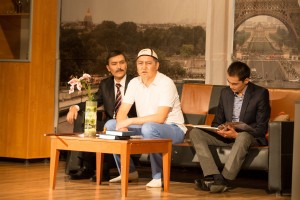 ASTANA – The Shanyrak Youth Theatre of Astana’s Eurasian National University (ENU) staged a drama by famous Kazakh playwright Zhotai Zhumat, “Eternal Nostalgia,” on June 28. The performance drew praise from those in attendance.
ASTANA – The Shanyrak Youth Theatre of Astana’s Eurasian National University (ENU) staged a drama by famous Kazakh playwright Zhotai Zhumat, “Eternal Nostalgia,” on June 28. The performance drew praise from those in attendance.
Young director Zhambul Tlepov and his colleagues, current and former students of the ENU, staged the play to coincide with the city’s celebrations of Astana Day, July 6.
The drama describes the yearning of an old man, Assan, to see the homeland he left as a child. Assan left Kazakhstan with his parents in the 1930s and, after 70 years or so, begins to miss it and dream about his native land. Assan, who now lives in Paris and is set to turn 80 in a year, begs his two adult sons, Marat and Yelzhan, to bring him back to his homeland.
The two sons, who have families and businesses of their own, are split between returning to Kazakhstan and staying in France. Marat, the oldest, shows a more business-oriented, bare-knuckled approach and categorically refuses to leave his business behind, leading to a split between the two families.
Yelzhan, however, gives his father an airplane ticket to fly to Astana as a birthday gift.
Upon arrival in Astana, Assan, Yelzhan and Yelzhan’s son, Yelaman, encounter a young local suffering from a serious illness who has a lot of grievances against his country and his people. He collapses in front of Assan, and Assan decides to help the young man by paying for the surgery he needs. In his last monologue, Assan asks the Almighty for his grace upon his motherland and his people.
The young local later searches for Assan to thank him for his help, only to find out that it is too late.
The drama is undoubtedly very patriotic, sometimes very straightforward and predictable. This does not diminish the quality of the text or the performance of the cast, however, and is balanced by some very frank and well-argued points by Marat about the merits of staying in one’s adopted nation.
“This play is intended to show to the spectators the particularities and divergences in opinions of today’s youth,” Zholtai Zhumat, the playwright said in an interview afterwards. “The two key characters of the play, Marat and Yelzhan, have completely different points of view regarding globalisation and modernisation of the Kazakh people’s way of thinking and the national mentality. They also differ regarding issues such as patriotism and the preservation of culture and values.
“The play was very emotional and I certainly wish success to the cast in their future performances in Kazakhstan and internationally,” ENU Professor of Sociology Marcus Kaiser of Germany said after the performance.
“It was very moving and, on a few occasions, I could hardly hold back tears,” Roman Vassilenko, chairman of the Committee for International Information of the Ministry of Foreign Affairs, said. “At one particularly dramatic moment, I heard the background sound of rain and of a thunderstorm. I thought it was an intentional sound effect, which would have been rather appropriate, but then I realised that the rain had just started outside. It was very symbolic, showing, perhaps, that the spirit of the sky, Tengri, welcomed the play and its message of one’s all-encompassing love for his motherland.”
The director and the author want to build on this success and stage another performance in the fall in Astana.
“The play was staged for the first time in English today,” Zhumat said. “And in the future we hope to put this play on the stages of theaters in other countries.”

